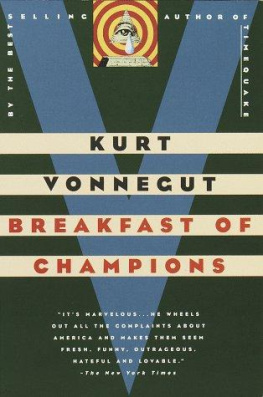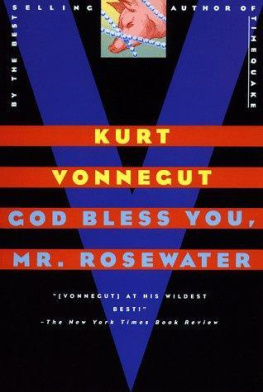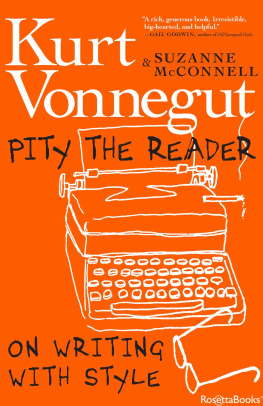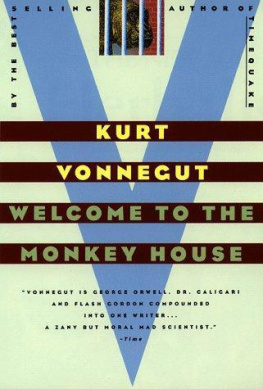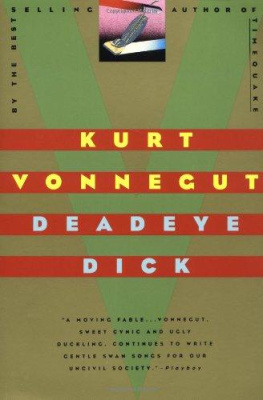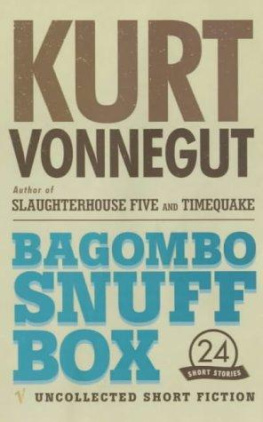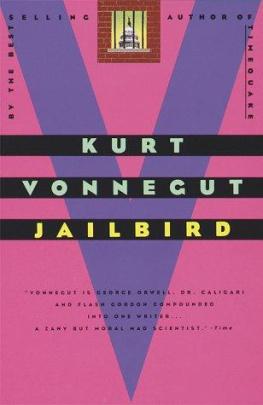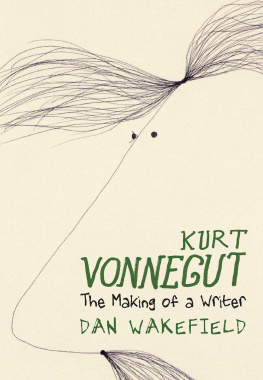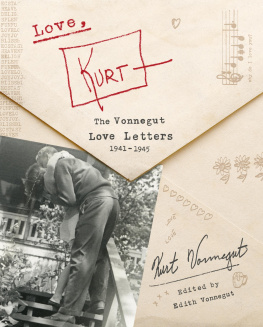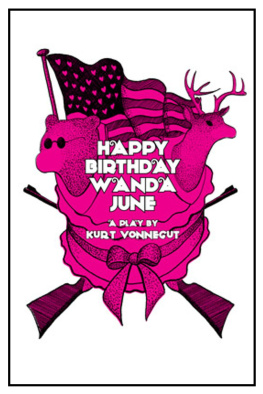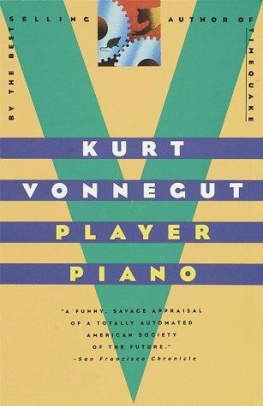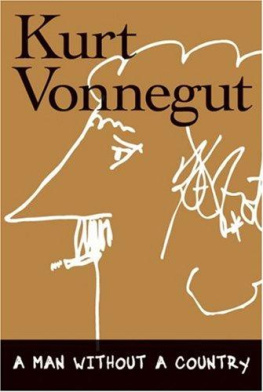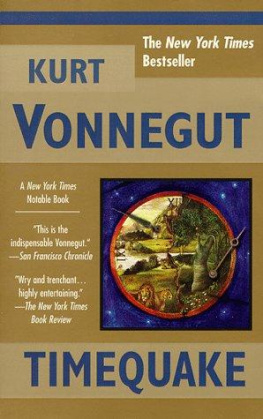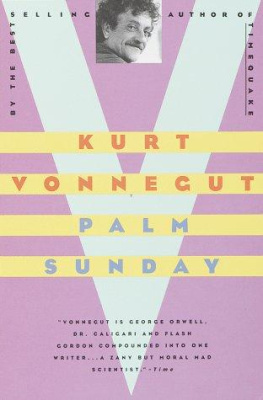Kurt Vonnegut - Breakfast of champions
Here you can read online Kurt Vonnegut - Breakfast of champions full text of the book (entire story) in english for free. Download pdf and epub, get meaning, cover and reviews about this ebook. year: 1999, publisher: Dell, genre: Detective and thriller. Description of the work, (preface) as well as reviews are available. Best literature library LitArk.com created for fans of good reading and offers a wide selection of genres:
Romance novel
Science fiction
Adventure
Detective
Science
History
Home and family
Prose
Art
Politics
Computer
Non-fiction
Religion
Business
Children
Humor
Choose a favorite category and find really read worthwhile books. Enjoy immersion in the world of imagination, feel the emotions of the characters or learn something new for yourself, make an fascinating discovery.
- Book:Breakfast of champions
- Author:
- Publisher:Dell
- Genre:
- Year:1999
- Rating:4 / 5
- Favourites:Add to favourites
- Your mark:
- 80
- 1
- 2
- 3
- 4
- 5
Breakfast of champions: summary, description and annotation
We offer to read an annotation, description, summary or preface (depends on what the author of the book "Breakfast of champions" wrote himself). If you haven't found the necessary information about the book — write in the comments, we will try to find it.
Breakfast of champions — read online for free the complete book (whole text) full work
Below is the text of the book, divided by pages. System saving the place of the last page read, allows you to conveniently read the book "Breakfast of champions" online for free, without having to search again every time where you left off. Put a bookmark, and you can go to the page where you finished reading at any time.
Font size:
Interval:
Bookmark:
KURT VOMMEGUT IS



UNIQUE one of the writers who map our landscapes for us, who give names to the places we know best. DORIS LESSING
The New York Times Book Review OUR FINEST BLACK-HUMORIST. We laugh in self-defense. The Atlantic Monthly AN UNIMITATIVE AND INIMITABLE SOCIAL SATIRIST. Harpers Magazine A CAUSE FOR CELEBRATION. Chicago Sun-Times A LAUGHING PROPHET OF DOOM. The New York Times
Breakfast of Champions
Cats Cradle
Deadeye Dick
Galpagos
God Bless You, Mr. Rosewater
Jailbird
Mother Night
Palm Sunday
Player Piano
The Sirens of Titan
Slapstick
Slaughterhouse-Five
Wampeters, Foma & Granfalloons
Welcome to the Monkey House



who comforted me in Indianapolis
during the Great Depression .
I shall come forth as gold .
JOB

T HE EXPRESSION Breakfast of Champions is a registered trademark of General Mills, Inc., for use on a breakfast cereal product. The use of the identical expression as the title for this book is not intended to indicate an association with or sponsorship by General Mills, nor is it intended to disparage their fine products. The person to whom this book is dedicated, Phoebe Hurty, is no longer among the living, as they say. She was an Indianapolis widow when I met her late in the Great Depression. I was sixteen or so. She was about forty. She was rich, but she had gone to work every weekday of her adult life, so she went on doing that. She wrote a sane and funny advice-to-the-lovelorn column for the Indianapolis Times , a good paper which is now defunct. Defunct. She wrote ads for the William H. Block Company, a department store which still flourishes in a building my father designed. She wrote this ad for an end-of-the-summer sale on straw hats: For prices like this, you can run them through your horse and put them on your roses. Phoebe Hurty hired me to write copy for ads about teenage clothes. I had to wear the clothes I praised. That was part of the job. And I became friends with her two sons, who were my age. I was over at their house all the time. She would talk bawdily to me and her sons, and to our girlfriends when we brought them around. She was funny. She was liberating. She taught us to be impolite in conversation not only about sexual matters, but about American history and famous heroes, about the distribution of wealth, about school, about everything. I now make my living by being impolite. I am clumsy at it. I keep trying to imitate the impoliteness which was so graceful in Phoebe Hurty. I think now that grace was easier for her than it is for me because of the mood of the Great Depression. She believed what so many Americans believed then: that the nation would be happy and just and rational when prosperity came. I never hear that word anymore: Prosperity . It used to be a synonym for Paradise . And Phoebe Hurty was able to believe that the impoliteness she recommended would give shape to an American paradise. Now her sort of impoliteness is fashionable. But nobody believes anymore in a new American paradise. I sure miss Phoebe Hurty. As for the suspicion I express in this book, that human beings are robots, are machines: It should be noted that people, mostly men, suffering from the last stages of syphilis, from locomotor ataxia , were common spectacles in downtown Indianapolis and in circus crowds when I was a boy. Those people were infested with carnivorous little corkscrews which could be seen only with a microscope. The victims vertebrae were welded together after the corkscrews got through with the meat between. The syphilitics seemed tremendously dignifiederect, eyes straight ahead. I saw one stand on a curb at the corner of Meridian and Washington streets one time, underneath an overhanging clock which my father designed. The intersection was known locally as The Crossroads of America. This syphilitic man was thinking hard there, at the Crossroads of America, about how to get his legs to step off the curb and carry him across Washington Street. He shuddered gently, as though he had a small motor which was idling inside. Here was his problem: his brains, where the instructions to his legs originated, were being eaten alive by corkscrews. The wires which had to carry the instructions werent insulated anymore, or were eaten clear through. Switches along the way were welded open or shut. This man looked like an old, old man, although he might have been only thirty years old. He thought and thought. And then he kicked two times like a chorus girl. He certainly looked like a machine to me when I was a boy. I tend to think of human beings as huge, rubbery test tubes, too, with chemical reactions seething inside. When I was a boy, I saw a lot of people with goiters. So did Dwayne Hoover, the Pontiac dealer who is the hero of this book. Those unhappy Earthlings had such swollen thyroid glands that they seemed to have zucchini squash growing from their throats. All they had to do in order to have ordinary lives, it turned out, was to consume less than one-millionth of an ounce of iodine every day. My own mother wrecked her brains with chemicals, which were supposed to make her sleep. When I get depressed, I take a little pill, and I cheer up again. And so on. So it is a big temptation to me, when I create a character for a novel, to say that he is what he is because of faulty wiring, or because of microscopic amounts of chemicals which he ate or failed to eat on that particular day. What do I myself think of this particular book? I feel lousy about it, but I always feel lousy about my books. My friend Knox Burger said one time that a certain cumbersome novel read as though it had been written by Philboyd Studge. Thats who I think I am when I write what I am seemingly programmed to write. This book is my fiftieth-birthday present to myself. I feel as though I am crossing the spine of a roofhaving ascended one slope. I am programmed at fifty to perform childishlyto insult The Star-Spangled Banner, to scrawl pictures of a Nazi flag and an asshole and a lot of other things with a felt-tipped pen. To give an idea of the maturity of my illustrations for this book, here is my picture of an asshole:
 I think I am trying to clear my head of all the junk in therethe assholes, the flags, the underpants. Yesthere is a picture in this book of underpants. Im throwing out characters from my other books, too. Im not going to put on any more puppet shows. I think I am trying to make my head as empty as it was when I was born onto this damaged planet fifty years ago. I suspect that this is something most white Americans, and nonwhite Americans who imitate white Americans, should do. The things other people have put into my head, at any rate, do not fit together nicely, are often useless and ugly, are out of proportion with one another, are out of proportion with life as it really is outside my head. I have no culture, no humane harmony in my brains. I cant live without a culture anymore. So this book is a sidewalk strewn with junk, trash which I throw over my shoulders as I travel in time back to November eleventh, nineteen hundred and twenty-two. I will come to a time in my backwards trip when November eleventh, accidentally my birthday, was a sacred day called Armistice Day . When I was a boy, and when Dwayne Hoover was a boy, all the people of all the nations which had fought in the First World War were silent during the eleventh minute of the eleventh hour of Armistice Day, which was the eleventh day of the eleventh month. It was during that minute in nineteen hundred and eighteen, that millions upon millions of human beings stopped butchering one another. I have talked to old men who were on battlefields during that minute. They have told me in one way or another that the sudden silence was the Voice of God. So we still have among us some men who can remember when God spoke clearly to mankind. Armistice Day has become Veterans Day. Armistice Day was sacred. Veterans Day is not. So I will throw Veterans Day over my shoulder. Armistice Day I will keep. I dont want to throw away any sacred things. What else is sacred? Oh, Romeo and Juliet , for instance. And all music is. PHILBOYD STUDGE
I think I am trying to clear my head of all the junk in therethe assholes, the flags, the underpants. Yesthere is a picture in this book of underpants. Im throwing out characters from my other books, too. Im not going to put on any more puppet shows. I think I am trying to make my head as empty as it was when I was born onto this damaged planet fifty years ago. I suspect that this is something most white Americans, and nonwhite Americans who imitate white Americans, should do. The things other people have put into my head, at any rate, do not fit together nicely, are often useless and ugly, are out of proportion with one another, are out of proportion with life as it really is outside my head. I have no culture, no humane harmony in my brains. I cant live without a culture anymore. So this book is a sidewalk strewn with junk, trash which I throw over my shoulders as I travel in time back to November eleventh, nineteen hundred and twenty-two. I will come to a time in my backwards trip when November eleventh, accidentally my birthday, was a sacred day called Armistice Day . When I was a boy, and when Dwayne Hoover was a boy, all the people of all the nations which had fought in the First World War were silent during the eleventh minute of the eleventh hour of Armistice Day, which was the eleventh day of the eleventh month. It was during that minute in nineteen hundred and eighteen, that millions upon millions of human beings stopped butchering one another. I have talked to old men who were on battlefields during that minute. They have told me in one way or another that the sudden silence was the Voice of God. So we still have among us some men who can remember when God spoke clearly to mankind. Armistice Day has become Veterans Day. Armistice Day was sacred. Veterans Day is not. So I will throw Veterans Day over my shoulder. Armistice Day I will keep. I dont want to throw away any sacred things. What else is sacred? Oh, Romeo and Juliet , for instance. And all music is. PHILBOYD STUDGEFont size:
Interval:
Bookmark:
Similar books «Breakfast of champions»
Look at similar books to Breakfast of champions. We have selected literature similar in name and meaning in the hope of providing readers with more options to find new, interesting, not yet read works.
Discussion, reviews of the book Breakfast of champions and just readers' own opinions. Leave your comments, write what you think about the work, its meaning or the main characters. Specify what exactly you liked and what you didn't like, and why you think so.

